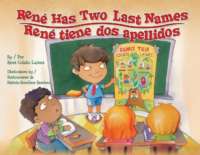
Young Rene is from El Salvador, and he doesn’t understand why his name has to be different in the United States. When he writes Colato, he sees his paternal grandparents, Rene and Amelia. When he writes Lainez, he sees his maternal grandparents, Angela and Julio. His new classmates giggle when Rene tells them his long name. So when the students are given a project to create a family tree, Rene is determined to explain the importance of using both of his last names. On the day of his presentation, Rene explains that he is as hard working as Abuelo Rene, who is a farmer, and as creative as his Abuela Amelia, who is a potter. He can tell stories like his Abuelo Julio and enjoys music like his Abuela Angela.
This book has been included in WOW’s Language and Learning: Children’s and Young Adult Fiction Booklist. For our current list, visit our Booklist page under Resources in the green navigation bar.
- ISBN: 9781558855304
- Author: Lainez, Rene Colato
- Published: 2009 , Arte Publico Pr
- Themes: Culture, Family, Identity, Names, traditions
- Descriptors: Americas, Bilingual, Early Years (ages 2-6), El Salvador, Latinx in US, Picture Book, Primary (ages 6-9), Realistic Fiction, United States
- No. of pages: 32

This is a great story showing the cultural conflict between a Latina and American custom surrounding names. While in the US children usually have one family name, Rene proudly carries and signs both his family names, one from his father and one from his mother. Both are significant to him, and without one he feels like he has lost half of his family. This story again deals with negotiating names in a new country and how important that name is to identity. However it goes a bit farther in reminding school personnel that names need to be respected, and sometimes that means the whole name.
Similar books – Loosing one of your names
Me llamo Maria Isabel / My Name is Maria Isabel (Alma Flor Ada) – Maria Isabel faces a similar situation but with an added twist. Not only does her teacher take away one of her names, but she changes Maria to Mary since the class already has a student named Maria. This devastates Maria Isabel, and she struggles in school because she does not ‘hear’ her new name in time to respond to the teacher’s questions. She is finally able to communicate her struggles and her deep connection to both her names through an essay about her greatest wish.
My Name is Keoko (Linda Sue Park) – During the occupation of Korea by Japan in WWII, Koreans were required to give up their names and to take on Japanese names. This novel describes the struggles that ensue for 10 year old Sun-hee and her brother as they try to retain their Korean identity during the 5 year occupation.